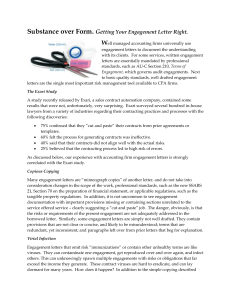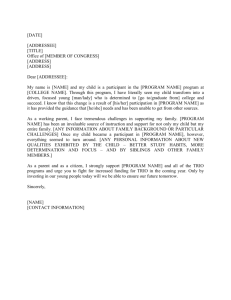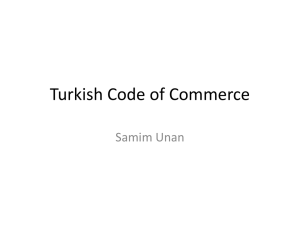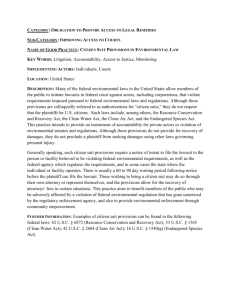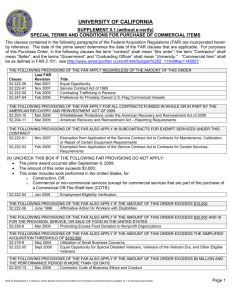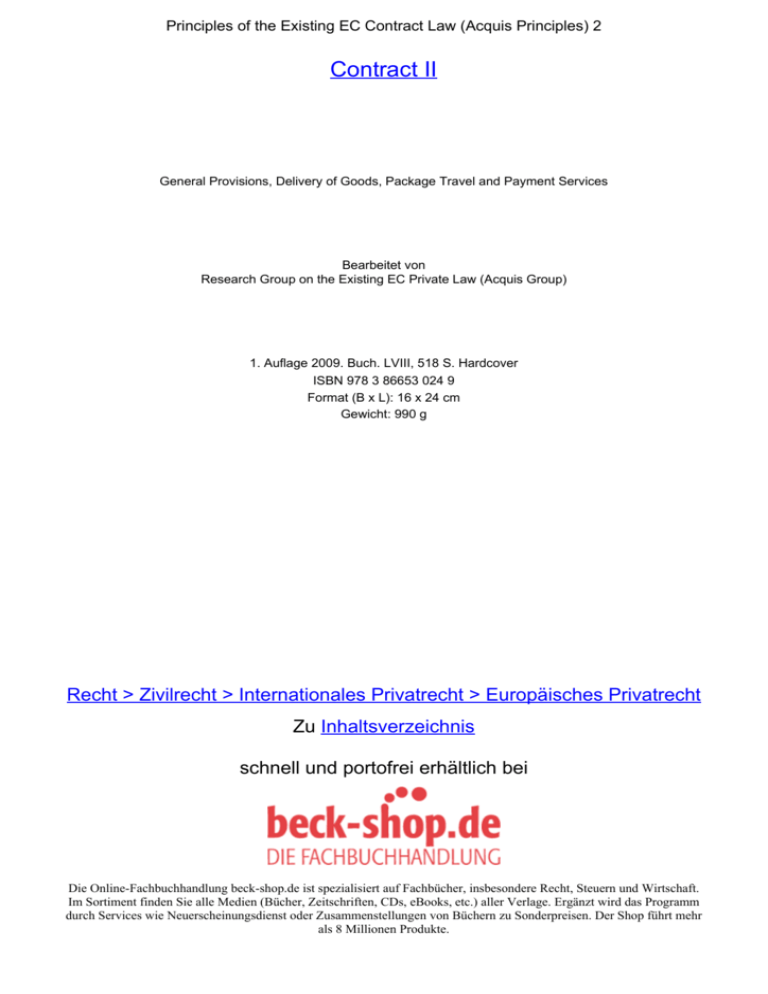
Principles of the Existing EC Contract Law (Acquis Principles) 2
Contract II
General Provisions, Delivery of Goods, Package Travel and Payment Services
Bearbeitet von
Research Group on the Existing EC Private Law (Acquis Group)
1. Auflage 2009. Buch. LVIII, 518 S. Hardcover
ISBN 978 3 86653 024 9
Format (B x L): 16 x 24 cm
Gewicht: 990 g
Recht > Zivilrecht > Internationales Privatrecht > Europäisches Privatrecht
Zu Inhaltsverzeichnis
schnell und portofrei erhältlich bei
Die Online-Fachbuchhandlung beck-shop.de ist spezialisiert auf Fachbücher, insbesondere Recht, Steuern und Wirtschaft.
Im Sortiment finden Sie alle Medien (Bücher, Zeitschriften, CDs, eBooks, etc.) aller Verlage. Ergänzt wird das Programm
durch Services wie Neuerscheinungsdienst oder Zusammenstellungen von Büchern zu Sonderpreisen. Der Shop führt mehr
als 8 Millionen Produkte.
Principles of the Existing EC Contract Law
(Acquis Principles)
Contract II
General Provisions, Delivery of Goods,
Package Travel and Payment Services
prepared by
Research Group on the Existing EC Private Law
(Acquis Group)
ISBN (print) 978-3-86653-024-9
ISBN (eBook) 978-3-86653-873-3
The Deutsche Nationalbibliothek lists this publication in the Deutsche Nationalbibliografie;
detailed bibliographic data are available on the Internet at http://dnb.d-nb.de.
© 2009 by sellier. european law publishers GmbH, Munich.
All rights reserved. No part of this publication may be reproduced, translated, stored in a retrieval
system or transmitted, in any form or by any means, electronic, mechanical, photo-copying, recording or otherwise, without prior permission of the publisher.
Design: Sandra Sellier, Munich. Production: Karina Hack, Munich. Typesetting: fidus PublikationsService GmbH, Nördlingen. Typeface: Goudy Old Style and Goudy Sans from Linotype. Printing
and binding: Friedrich Pustet KG, Regensburg. Printed on acid-free, non-ageing paper. Printed in
Germany.
fidus Publikations-Service
{Sellier}Princ_Acquis_Group_Contract II/daten_3b2/Princ_Acquis_Group_Contract_2_Text.3d Insgesamt 518 Seiten 2. AK
fidus Publikations-Service
{Sellier}Princ_Acquis_Group_Contract II/daten_3b2/Princ_Acquis_Group_Contract_2_Text.3d Insgesamt 518 Seiten 2. AK
Structure of the Acquis Principles
Chapter 1: Introductory Provisions
Section 1: Scope
Section 2: Consumer and business
Section 3: Notice and form
Chapter 2: Pre-contractual Duties
General Provisions
Section 1: General duties
Section 2: Pre-contractual information duties
Specific Provisions
Part A: Contracts Negotiated Away from Business Premises
Part B: Contracts for the Delivery of Goods
Part C: Timeshare Contracts
Part D: Service Contracts
Part E: Package Travel Contracts
Part F: Consumer Credit Contracts
Part G: Payment Services
Chapter 3: Non-Discrimination
Section 1: General Rules/Definitions
Section 2: Remedies
Chapter 4: Formation
General Provisions
Specific Provisions
Part C: Timeshare Contracts
Part E: Package Travel Contracts
Part F: Consumer Credit Contracts
Chapter 5: Withdrawal
General Provisions
Specific Provisions
Part A: Contracts Negotiated Away from Business Premises
Part C: Timeshare Contracts
1:101
1:201 – 1:203
1:301 – 1:308
2:101 – 2:103
2:201 – 2:208
2:A-01
2:B-01
2:C-01
2:D-01
2:E-01
2:F-01
2:G-01 – 2:G-03
3:101 – 3:103
3:201 – 3:203
4:101 – 4:110
4:C-01
4:E-01
4:F-01
5:101 – 5:106
5:A-01 – 5:A-03
5:C-01, 5:C-02
3
fidus Publikations-Service
{Sellier}Princ_Acquis_Group_Contract II/daten_3b2/Princ_Acquis_Group_Contract_2_Text.3d Insgesamt 518 Seiten 2. AK
Structure of the Acquis Principles
Chapter 6: Non-Negotiated Terms
Section 1: Scope of application
Section 2: Inclusion and interpretation of terms
Section 3: Validity of terms
Chapter 7: Content and Performance of Obligations
General Provisions
Section 1: General duties
Section 2: Modalities of Performance
Specific Provisions
Part A: Contracts Negotiated Away from Business Premises
Part B: Contracts for the Delivery of Goods
Part E: Package Travel Contracts
Part G: Payment Services
Part H: Commercial Agency Contracts
Chapter 8: Remedies
General Provisions
Section 1: General rules
Section 2: Performance and cure of non-performance
Section 3: Termination and reduction of performance
Section 4: Damages
Specific Provisions
Part A: Contracts Negotiated Away from Business Premises
Part B: Contracts for the Delivery of Goods
Part E: Package Travel Contracts
Part G: Payment Services
Part H: Commercial Agency Contracts
4
6:101
6:201 – 6:204
6:301 – 6:306
7:101 – 7:105
7:201 – 7:202
7:A-01
7:B-01, 7:B-02
7:E-01 – 7:E-06
7:G-01 – 7:G-25
7:H-01 – 7:H-16
8:101, 8:102
8:201, 8:202
8:301 – 8:304
8:401 – 8:407
8:A-01
8:B-01 – 8:B-07
8:E-01 – 8:E-04
8:G-01 – 8:G-12
8:H-01
fidus Publikations-Service
{Sellier}Princ_Acquis_Group_Contract II/daten_3b2/Princ_Acquis_Group_Contract_2_Text.3d Insgesamt 518 Seiten 2. AK
Text of the Acquis Principles
Chapter 1:
Introductory Provisions
Section 1:
Scope
Article 1:101: Scope and purpose of these Principles
(1) The following principles and rules are formulated on the basis of the existing law of the European Community in the field of contract law.
(2) These principles and rules serve as a source for the drafting, the transposition and the interpretation of European Community law.
(3) They are not formulated to apply in the areas of labour law, company law, family law or inheritance law.
Section 2:
Consumer and business
Article 1:201: Consumer
Consumer means any natural person who is mainly acting for purposes which are outside this
person’s business activity.
Article 1:202: Business
Business means any natural or legal person, irrespective of whether publicly or privately owned,
who is acting for purposes relating to this person’s self-employed trade, work or profession, even
if this person does not intend to make profit in the course of this activity.
Article 1:203: Mandatory nature of consumer rules
(1) Unless provided otherwise, contract terms which are prejudicial to the consumer and which
deviate from rules applicable specifically to relations between businesses and consumers are not
binding on the consumer. This does not apply to contracts which settle an existing dispute.
(2) Paragraph (1) applies accordingly to unilateral promises.
Section 3:
Notice and form
1
Article 1:301: Means of notice
Notice may be given by any means appropriate to the circumstances.
1
Grey rule from Art. II. – 1:109(2) DCFR.
5
fidus Publikations-Service
{Sellier}Princ_Acquis_Group_Contract II/daten_3b2/Princ_Acquis_Group_Contract_2_Text.3d Insgesamt 518 Seiten 2. AK
Text of the Acquis Principles
2
Article 1:302: Effectiveness of notice
(1) The notice becomes effective when it reaches the addressee, unless it provides for a delayed effect.
(2) The notice reaches the addressee:
(a) when it is delivered to the addressee;
(b) when it is delivered to the addressee’s place of business, or, where there is no such
place of business or the notice does not relate to a business matter, to the addressee’s habitual residence;
(c) when it is otherwise made available to the addressee at such a place and in such a
way that the addressee could reasonably be expected to obtain access to it without
undue delay.
Article 1:303: Electronic notice
A notice transmitted by electronic means reaches the addressee when it can be accessed by this
person. This rule is mandatory in the sense of Article 1:203 (Mandatory nature of consumer
rules) in relations between businesses and consumers.
Article 1:304: Freedom of form
Unless provided otherwise, no form needs to be observed in legal dealings.
Article 1:305: Textual form
‘Textual form’ means a text which is expressed in alphabetical or other intelligible characters by
means of any support that permits reading, recording of the information contained therein and
its reproduction in tangible form.
Article 1:306: Durable medium
‘Durable medium’ means any support which stores information so that it is accessible for future
reference for a period of time adequate to the purposes of the information, and which allows the
unchanged reproduction of this information.
Article 1:307: In writing
A statement is ‘in writing’ if it is in textual form and in characters which are directly legible from
paper or another durable medium on which the statement is stored.
Article 1:308: Signatures
(1) ‘Handwritten signature’ means the name of, or sign representing, a person written by that
person’s own hand for the purpose of authentication;
(2) ‘Electronic signature’ means data in electronic form which are attached to or logically associated with other electronic data, and which serve as a method of authentication;
(3) ‘Electronic’ means relating to technology with electrical, digital, magnetic, wireless, optical,
electromagnetic, or similar capabilities;
(4) ‘Advanced electronic signature’ means an electronic signature which meets the following requirements:
(a) it is uniquely linked to the signatory;
(b) it is capable of identifying the signatory;
2
6
Grey rule from Art. I. – 1:109(3) and (4) DCFR.
fidus Publikations-Service
{Sellier}Princ_Acquis_Group_Contract II/daten_3b2/Princ_Acquis_Group_Contract_2_Text.3d Insgesamt 518 Seiten 2. AK
Text of the Acquis Principles
(c) it is created using means which can be maintained under the signatory’s sole control;
and
(d) it is linked to the data to which it relates in such a manner that any subsequent change
of the data is detectable.
Chapter 2:
Pre-contractual Duties
General Provisions
Section 1:
General duties
Article 2:101: Good faith
In pre-contractual dealings, parties must act in accordance with good faith.
Article 2:102: Legitimate expectations
In pre-contractual dealings, a business must act with the special skill and care that may reasonably be expected to be used with regard, in particular, to the legitimate expectations of consumers.
Article 2:103: Negotiations contrary to good faith
(1) A party is free to negotiate and is not liable for failing to reach an agreement.
(2) However, a party who has conducted or discontinued negotiations contrary to good faith is
liable for loss caused to the other party.
(3) In particular, a party acts contrary to good faith if it enters into or continues negotiations
with no real intention of reaching an agreement.
Section 2:
Pre-contractual information duties
Article 2:201: Duty to inform about goods or services
Before the conclusion of a contract, a party has a duty to give to the other party such information
concerning the goods or services to be provided as the other party can reasonably expect, taking
into account the standards of quality and performance which would be normal under the circumstances.
Article 2:202: Information duties in marketing towards consumers
(1) Where a business is marketing goods or services to a consumer, the business must, with due
regard to the limitations of the communication medium employed, provide such material information as the average consumer can reasonably expect in the given context for a decision
on any steps to take towards concluding a contract for those goods or services.
(2) Where a business uses a commercial communication which gives the impression to consumers that it contains all the relevant information necessary to make a decision about concluding a contract, it must in fact contain all the relevant information. All the relevant infor7



